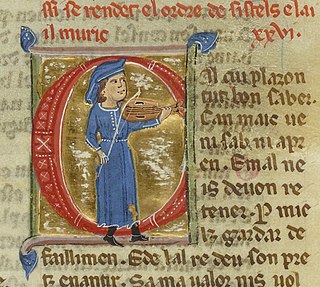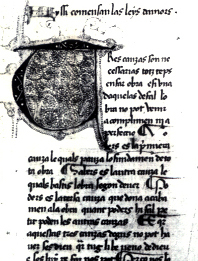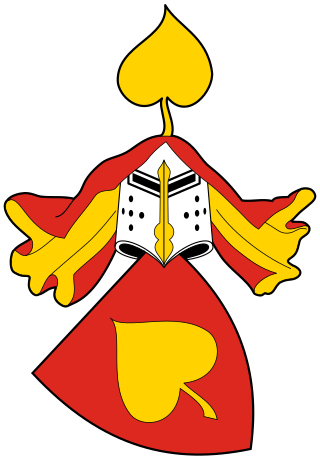See also
- Poetry
- 14th century in poetry
- 14th century in literature
- List of years in poetry
- Grands Rhétoriqueurs
- French Renaissance literature
- Renaissance literature
- Spanish Renaissance literature
Other events:
15th century:
| |||
|---|---|---|---|
| +... |
Nationality words link to articles with information on the nation's poetry or literature (for instance, Irish or France).
1324:
1327:
1310
1315–16
1316–18
1321:
1324:
1326:
1327:
Death years link to the corresponding "[year] in poetry" article. There are conflicting or unreliable sources for the birth years of many people born in this period; where sources conflict, the poet is listed again and the conflict is noted:
1320:
1325:
1327:
Birth years link to the corresponding "[year] in poetry" article:
1321:
1325:
1326:
1327:
1328:
1329:
Other events:
15th century:

A troubadour was a composer and performer of Old Occitan lyric poetry during the High Middle Ages (1100–1350). Since the word troubadour is etymologically masculine, a female equivalent is usually called a trobairitz.

Charles IV, called the Fair in France and the Bald in Navarre, was last king of the direct line of the House of Capet, King of France and King of Navarre from 1322 to 1328. Charles was the third son of Philip IV; like his father, he was known as "the fair" or "the handsome".
This article contains information about the literary events and publications of 14th century.
This article contains information about the literary events and publications of the 13th century.

Abu'l Hasan Yamīn ud-Dīn Khusrau, better known as Amīr Khusrau, was an Indo-Persian Sufi singer, musician, poet and scholar who lived during the period of the Delhi Sultanate.
Occitan literature is a body of texts written in Occitan, mostly in the south of France. It was the first literature in a Romance language and inspired the rise of vernacular literature throughout medieval Europe. Occitan literature's Golden Age was in the 12th century, when a rich and complex body of lyrical poetry was produced by troubadours writing in Old Occitan, which still survives to this day. Although Catalan is considered by some a variety of Occitan, this article will not deal with Catalan literature, which started diverging from its Southern French counterpart in the late 13th century.
Events from the 1320s in England.

Raimon de Cornet was a fourteenth-century Toulousain priest, friar, grammarian, poet, and troubadour. He was a prolific author of verse; more than forty of his poems survive, most in Occitan but two in Latin. He also wrote letters, a didactic poem, a grammar, and some treatises on computation. He was the "last of the troubadours" and represented l'esprit le plus brillant of the "Toulousain School". He appears in contemporary documents with the titles En and Frare.

The Consistori del Gay Saber was a poetic academy founded at Toulouse in 1323 to revive and perpetuate the lyric poetry of the troubadours.
The decade of the 1320s in art involved some significant events.
Nationality words link to articles with information on the nation's poetry or literature.
Nationality words link to articles with information on the nation's poetry or literature.
Nationality words link to articles with information on the nation's poetry or literature.
Nationality words link to articles with information on the nation's poetry or literature.
Nationality words link to articles with information on the nation's poetry or literature.
Nationality words link to articles with information on the nation's poetry or literature.

Rátót was the name of a gens in the Kingdom of Hungary. According to Simon of Kéza and other chroniclers, the ancestors of the clan were Italians from Caserta, Naples, by name Rathold and Oliver, who settled down in Hungary around 1097 during the reign of Coloman, King of Hungary. They came to Hungary alongside Felicia of Sicily.
The 1320s in music involved some events.